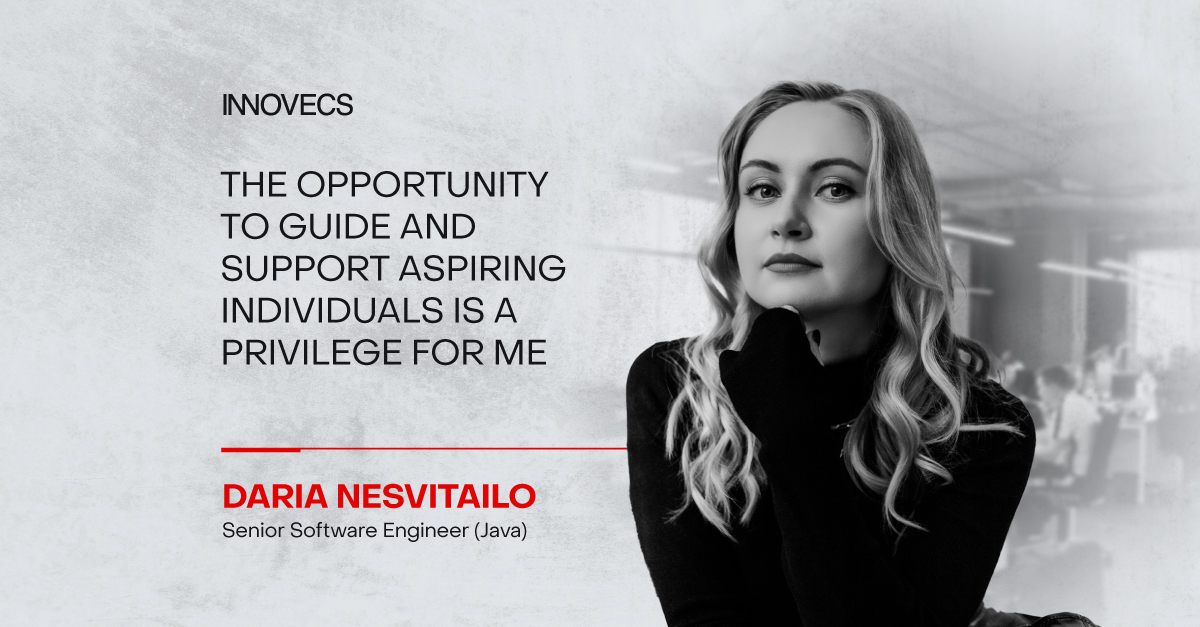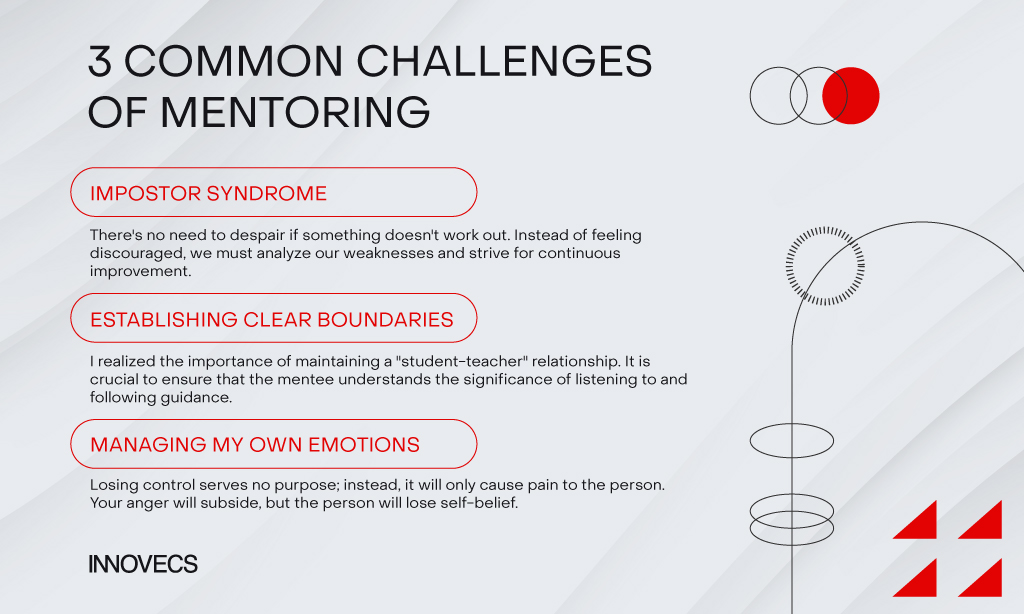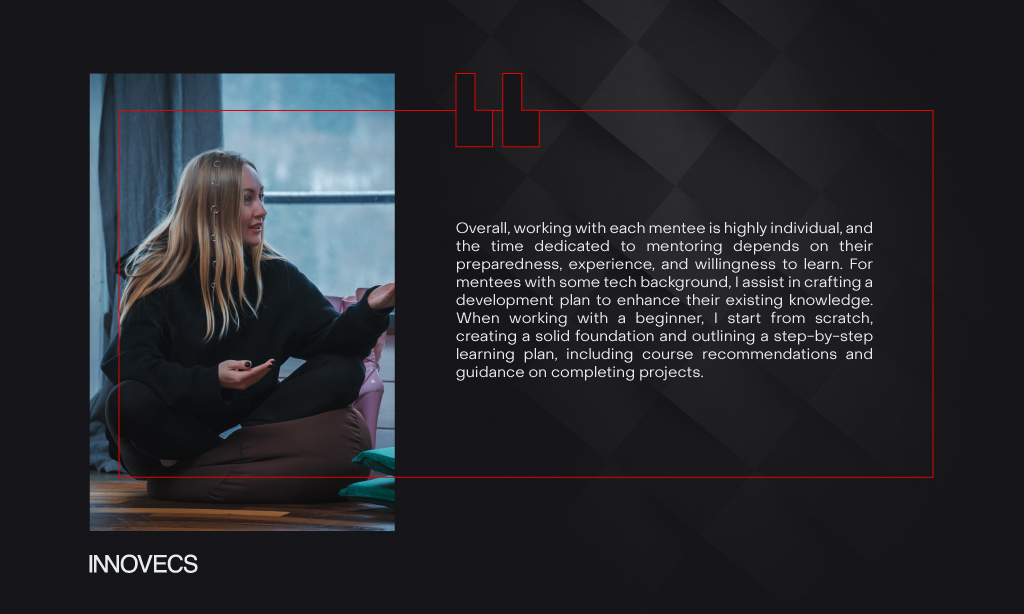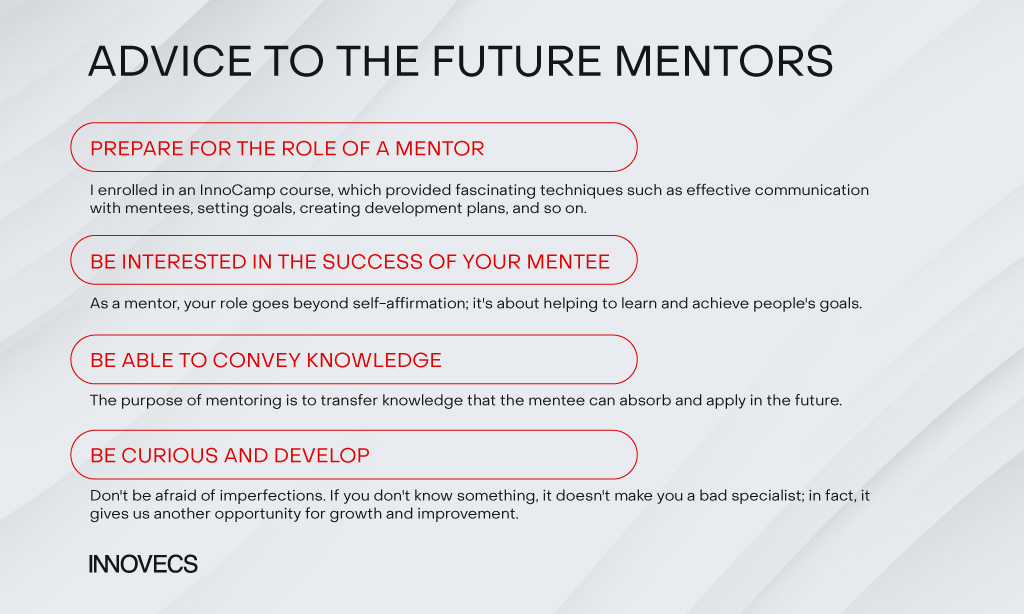My name is Nataliia Horova, and I continue to share the inspiring stories of our teammates. Today, I’d like to introduce you to Daria Nesvitailo, a Senior Software Engineer (Java).
In the interview, Daria shared how her participation in Innovecs’ Mentorship Program helped her to overcome impostor syndrome and establish boundaries with a mentee.
Her path to being a mentor is filled with guidance and growth. I hope Daria’s story inspires you to embark on your mentoring adventure, foster personal growth, and create a supportive community of lifelong learners.
— Hi, Daria! Thank you for agreeing to this interview. Could you please share what motivated you to become a mentor?
In my childhood, I dreamed of teaching people, and the idea of sharing my knowledge with others always inspired me. But at school, I realized that my passion was the tech sphere, and my interests leaned more toward mathematics and physics. Therefore, when the time came to choose speciality at the university, it was clear as day — I picked computer technology without hesitation. Although, during my studies at university, I considered switching to psychology. Programming and psychotherapy are very similar, not only because they both start with the “P.” Analysis is a key characteristic in both fields. In programming, the skill set encompasses analyzing code, comprehending cause-and-effect relationships, and continuously striving for improved outcomes. Psychotherapy operates on parallel grounds. Instead of analyzing code, it focuses on understanding the individual, unraveling causal connections, and enhancing their emotional well-being. Both disciplines share the common goal of solving complexities and fostering positive transformations.
However, I ultimately chose to pursue a career as an engineer, and it has been a decision I have never regretted. Moreover, working in this area allows me to develop professionally and contribute to the evolution of future generations of technical specialists, combining my passion for teaching with my expertise in programming and psychology.
So, when the opportunity arose to become a mentor in the Mentorship Program at Innovecs, I embraced it, despite my initial concerns. Thanks to this program, I embarked on a rewarding journey as a mentor and am currently guiding my third mentee toward his goals.
— How do mentors and mentees get acquainted? Who makes the choice — a mentor or a mentee?
Getting to know each of my mentees was an exciting experience.
For example, in the Mentorship Program at Innovecs, we divided into two groups — mentors and mentees — and began by sharing interesting and essential details about ourselves, our work, personal values, and more. When harmonious connection occurred, it led to the formation of mentor-mentee partnerships. As an example, I expressed my belief in the importance of having a genuine desire to learn and become a programmer, evident through the “sparkle in their eyes.” During our meeting, I heard my future mentee express that his eyes were indeed sparkling, showing his specific interest in working with me. Sharing common principles and moving in the same direction is vital for fostering a successful collaboration.
The mentee I am currently working with reached out to me based on recommendations from acquaintances, expressing a strong desire to learn from my experience. It was a pleasant surprise to receive such a direct and enthusiastic request for mentorship. Initially, I wanted to ensure his seriousness and commitment. To do so, I provided detailed information on our future collaboration, discussed his comfort level with the development plan I had prepared, and analyzed our compatibility as mentor and mentee. By taking the time to analyze these factors, we established a strong foundation for our journey together.
Our collaboration is going well, and I am very proud that my mentee has already completed a pet project, which impressed me and kindled my inspiration. This is likely one of the reasons why I engage and find joy in mentoring — to gain inspiration from the enthusiasm and drive of individuals starting their tech careers.
When you reach a certain level in your career, you gradually start feeling tired of further growth and learning, and that’s normal. However, observing someone else’s journey reminds me of accomplishments and invested effort. You begin to appreciate your achievements even more and become inspired to do and learn new things once again.
— What challenges did you face as a mentor, and how did you overcome them?
One of the primary challenges I encountered was dealing with impostor syndrome and the uncertainty of being a competent professional, despite having sufficient experience. For instance, I was afraid of appearing unqualified in the eyes of my mentee and losing credibility if I couldn’t answer one of his questions. However, based on my own experience, I realized the importance of confronting these fears head-on. While there were moments when I didn’t answer some questions, I later learned that such situations could be an opportunity to grow and improve.



